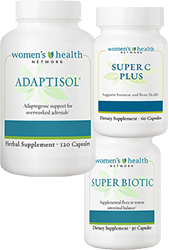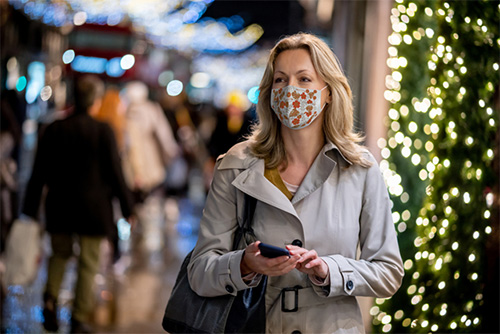Authored by Dr. Sharon Stills, NMD
There are still a lot of “Covid Deniers” out there. You’ve probably heard people say, “We over-reacted. The coronavirus hasn’t been so bad. It’s only old people who are at risk. They should isolate themselves so the rest of us can go back to our normal lives.”

This kind of thinking puts you and everyone else at risk. Here’s why:
- Actually up to half the population is at heightened risk of a severe case of Covid-19 — everyone with a suppressed immune system, which could be from disease, medications, past medical history, and so on.
- Covid-19 remains active in the US with new hot spots emerging and epidemiology models predicting a second wave in the fall. Staying in “alert” mode.
- It’s true that the elderly are at heightened risk of dying, but Covid-19 puts people of all ages in the hospital. The young are more likely to survive. But not if the hospitals become overwhelmed with patients — as they will be if the pandemic continues to grow.
You want to protect yourself and your loved ones from coronavirus. So let’s dig a little deeper into how your immune system gets suppressed. We’ll look at the obvious factors so you can figure out who in your family is at greatest risk. And we’ll talk about some not-so-obvious signs that your immune system needs more support.

It isn’t just the elderly at risk
It’s true that our current knowledge says that 80% of Covid-19 infections are mild; some of those infected show no symptoms, or just the signs of a common cold. This is also one reason why it spreads so fast: many of the carriers don’t know they are sick, so they go about their normal lives and infect lots of other people.
It’s also true that most of those who have died are elderly, and that the elderly are at multiplied risk compared to the young.
But that isn’t the whole story, and the truth is only now beginning to emerge. Of the 20% whose cases are serious, they are of all ages. This is vital to understanding the threat of this disease going forward into this next phase of the pandemic. Epidemiologists are planning on scenarios in which various percentages of the population get infected, over various horizons of time, and with varying percentages requiring hospitalization.
In the best case, based on the data so far, we think about 20% of infected individuals will have such a severe case that they require hospitalization. What do they have in common? The research is still incomplete, but almost by definition, this 20%is the people with compromised immune systems.
Why are their immune systems compromised? Now we’re getting into something that every doctor knows, but very few patients. It’s that there are dozens of diseases,medical treatments, health conditions, and medications that all damage or suppress your immune system.

Who are they? Here’s a partial list. Think of everyone among your family and friends who can be described as:
- Suffers a disease that compromises the immune system. This includes cancer, diabetes, high blood pressure, rheumatoid arthritis, inflammatory bowel disease, COPD, all autoimmune diseases, and many others.
- Suffers a condition that acts similarly. These conditions include metabolic syndrome, all chronic inflammatory conditions, intestinal dysbiosis, irritable bowel syndrome, etc.
- Has had medical treatment such as chemotherapy, radiation, tonsillectomy, etc.
- Experienced infections that damage the respiratory organs, especially pneumonia or chronic bronchitis, or any chronic infection.
- Taking medication, not just those that are intended primarily to suppress immune function (there are several categories) but those which as an unintended side effect impair immune function, including many of the most-prescribed drugs in the world: statins, birth control pills, antibiotics and all psychotropic drugs.
- The elderly, because immune function generally declines as we age.
- Pregnant women, who seem to be especially at risk for severe COVID-19 infections that affect both mother and fetus.
So — you realize immediately we are talking about tens of millions of people at risk. No wonder the CDC reported that 38% of those hospitalized with COVID-19 were aged 20-54. That’s young! Even more concerning, almost half of the sickest patients were under 65. But when you realize this is also an epidemic of suppressed immunity — as we see in the list above — it begins to make sense.
Let’s go back to the argument that only the elderly are at risk. Anyone who thinks that just doesn’t know the facts. I might go further: they’re not living in the real world. And if they act like they aren’t at risk, then they become vectors for the virus.
In the science of infectious diseases, a “vector” is an agent of contagion — an animal, person or other factor that spreads the infection. With Covid-19, it’s important for everyone to understand that “Vectors Make Victims” — and you don’t want to be either.

What’s your Covid-19 risk profile?
Many of us live in “mixed risk households.” We have different Covid-19 risk profiles,and different behaviors too. You may be struggling to get everyone in your home to agree on a united front — a consensus about how to behave, especially as lock downs loosen.
So I want to you to have some information on how you can begin to assess how well your own immune system is functioning — and your family members’ immune function too! Go through the list below and then read on for specific clues you can look for that can indicate your immune function needs extra support.
25 Health & Lifestyle Conditions That Lower ImmunityWe’re told that 15% of us are at greater risk for disease, and it’s mostly the elderly. The reality is — it’s way more than that — and age often has nothing to do with it. Conditions, Treatments & Medications That Damage Immune Function |
|
|---|---|
| 1. Antibiotics 2. Asthma 3. Birth Control Pills 4. Chronic Bronchitis 5. Cancer Chemotherapy & Radiation 6. Chronic Infections 7. Chronic Stress 8. COPD 9. Diabetes 10. Excessive Alcohol Consumption 11. Excessive Intake of Sugary Foods and Drink 12. High Blood Pressure 13. Inflammatory Bowel Disease |
14. Intestinal Dysbiosis 15. Insomnia and Lack of Sleep 16. Immune-Suppressing Medications (prescribed for rheumatoid arthritis and severe allergies) 17. Metabolic Syndrome 18. Pneumonia (damage to respiratory organs) 19. Poor Nutrition (lack of raw materials for a robust immune system) 20. Pregnancy 21. Psychotropic Drugs 22. Smoking 23. Statin drugs 24. Tonsillectomy (having your tonsils removed) 25. Toxicity |
5 signs your immune system needs extra support
1. You’re under chronic stress.
Do you often come down with a cold or bad case of the sniffles after a big project at work or big emotional situation at home? The underlying culprit could be stress,which is a known factor for weakening immune system response. Stress, and the cascade of hormonal and physiological changes it triggers in the body, is associated with decreased levels of lymphocytes, the white blood cells that fight off infection.This puts you at risk for things like cold and flu viruses.
If you are under chronic stress — and honestly, who isn’t these days? — you need to take immediate corrective measures to protect yourself. Rebalance stress hormones with a quality stress-relief supplement, and use mind-body techniques such as meditation to cut the stress.Your immune system will thank you.
2. You have digestive issues.
Research shows that nearly 70% of your immune system is located in your digestive tract,making your gut a major “home base” for your body’s immunity. All along the lining of your gut, beneficial bacteria and microorganisms that live there defend your gut from infection and support immune function, including the production of white blood cells. Other cells detect pathogens and tell the immune system to swing into action.
When not enough good bacteria flourishes, bad bacteria moves in, disturbing allyour intestinal immune function, and putting you at increased risk for infection and autoimmune disorders. Having lots of digestive issues — including gas and bloating– is a sign that your good gut bacteria may be short supply and needs restocking with a quality probiotic.

3. You’re tired all the time.
Constantly feel exhausted, even after just waking up from a full night’s sleep?This could be a warning sign from your immune system. According to researchers,when immune function is struggling, the body will attempt to funnel more energy to the immune system to get it back up to speed. This added effort can leave the rest of you feeling depleted and tired.
If your energy levels are rock bottom, and you really can’t explain why, try an antioxidant supplement. Antioxidant compounds help to protect immunity at the cellular level and enhance immune function.
4. Your diet is high in sugar.
Eating or drinking too much sugar can dampen your immune function, putting your white blood cells into a sort of “coma,” as researchers describe it. You want your immune system to be ready for action, so ditch sugary foods and embrace foods that provide immune support. These include fruits and vegetables that are rich in antioxidant vitamins A, C and E, including berries, citrus fruits, apples, red grapes, kale,onions, spinach, sweet potatoes, and carrots.
Another favorite immune-building food is garlic, which contains natural compounds that help fight viruses and bacteria. Some mushroom varieties — such as shiitake — also help strengthen immune function.
5. Your wounds take a long time to heal.
Whenever you get a paper cut or scrape your knee, your body sends nutrient-rich blood to the injury to jump start healing and skin regeneration. To be a success,this process relies on healthy immune cells. So if your scrapes, cuts and other skin wounds take a long time to heal, this can be a sign of compromised immunity,often triggered by underlying diabetes. If you do notice slow healing wounds, please get checked out by your doctor.

Let’s look on the bright side
If there is a silver lining to this time we’re living through, it’s that we are finally talking about immune health and all the things we can do to take better care of it! I encourage you to check in with your body to see how your immunity is doing, and what steps you can take to turn on its super powers for keeping you healthy and well.
I also think it’s high time we grow more mindful of how our behaviors affect one another. Wellness is not just every man for himself. Covid-19 is bringing that home in more ways than one.
|
|
Shop for Immune Support |
|
Your Satisfaction Is 100% Guaranteed












